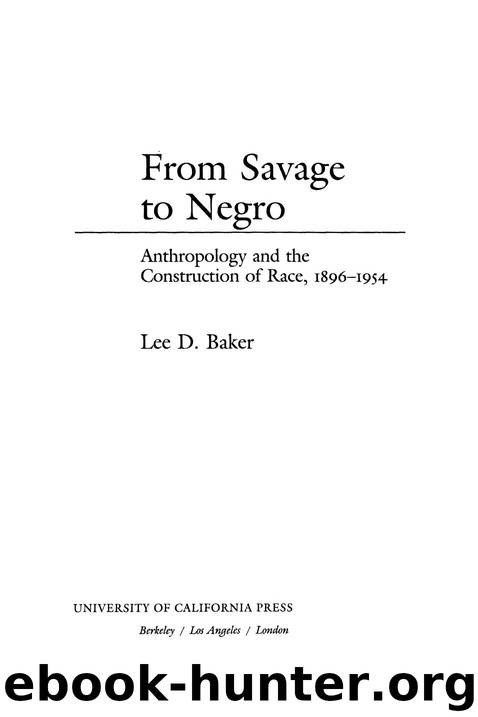From Savage to Negro by Baker Lee D.;

Author:Baker, Lee D.;
Language: eng
Format: epub
Publisher: University of California Press
Published: 1998-03-17T16:00:00+00:00
The Decline of Negro Folklore in Anthropology
Elsie Clews Parsons, Franz Boas, Frank Speck, and Carter G. Woodson provided the financial and structural foundation for an important program in Negro folklore, but it flourished for only a short time. It actually contributed more to the promoters of the New Negro than to anthropological theories of race and culture. Many of the reasons for the failure of the program were circumstantial. Boas had neither the ability nor the inclination to consistently secure funds for his Black students. Moreover, he had assumed commitments and responsibilities that did not allow him to focus on or support Negro folklore projects. The AFLS project could not survive without Boas’s continuous support.
Other reasons for the failure were not circumstantial, however. William Willis, Jr. highlighted the more substantive reasons for Boas’s intermittent support, arguing that Boas viewed African American folklore strictly in terms of survivals from Africa and not integral to the southern Negro experience. The study of African American culture by way of folklore required symbolic interpretations and a consideration of the social environment. Boas was thwarted by his literalism. “For instance he saw animals as animals and not as persons in animal fables. . . . Boas strongly resisted symbolic interpretations. . . . Boas’s distrust of folklore severely restricted his insights into the black experience in slavery and under Jim Crow.”75 Boas also failed to follow his own views that folklore must be viewed in relation to the environment. He did not view the hostile social climate of the South (and the North) endured by Negroes in the same terms as the rainy climate of the Pacific Northwest endured by Kwakiutl or the arid climate of the Southwest endured by Great Basin Shoshone—part of the environment to which cultural strategies helped people to adapt. There is a final note that perhaps led to Boas’s patchy enthusiasm for Negro folklore. He may have sensed how the JAFL was becoming party to the promoters of the New Negro and their attempts to promote “race consciousness.” Boas was “absolutely opposed to all kinds of attempts to foster racial solidarity.”76 He made little distinction between nationalism in Europe and “racial solidarity” among African Americans in the United States. He viewed both as roadblocks to a fully integrated society.
The Negro folklore promoted by the AFLS has been virtually erased by historians of anthropology and locked out of the anthropological canon. There were a number of other scholars who used African American folklore as a vehicle for vindication but were not associated with the JAFL. Two notable examples were Katherine Dunham and Irene Diggs.
Download
This site does not store any files on its server. We only index and link to content provided by other sites. Please contact the content providers to delete copyright contents if any and email us, we'll remove relevant links or contents immediately.
| African-American Studies | Asian American Studies |
| Disabled | Ethnic Studies |
| Hispanic American Studies | LGBT |
| Minority Studies | Native American Studies |
Cecilia; Or, Memoirs of an Heiress — Volume 1 by Fanny Burney(32063)
Cecilia; Or, Memoirs of an Heiress — Volume 3 by Fanny Burney(31458)
Cecilia; Or, Memoirs of an Heiress — Volume 2 by Fanny Burney(31409)
The Great Music City by Andrea Baker(30781)
We're Going to Need More Wine by Gabrielle Union(18633)
All the Missing Girls by Megan Miranda(14740)
Pimp by Iceberg Slim(13779)
Bombshells: Glamour Girls of a Lifetime by Sullivan Steve(13686)
Fifty Shades Freed by E L James(12916)
Talking to Strangers by Malcolm Gladwell(12875)
Norse Mythology by Gaiman Neil(12828)
For the Love of Europe by Rick Steves(11487)
Crazy Rich Asians by Kevin Kwan(8890)
Mindhunter: Inside the FBI's Elite Serial Crime Unit by John E. Douglas & Mark Olshaker(8702)
The Lost Art of Listening by Michael P. Nichols(7161)
Enlightenment Now: The Case for Reason, Science, Humanism, and Progress by Steven Pinker(6875)
The Four Agreements by Don Miguel Ruiz(6319)
Bad Blood by John Carreyrou(6278)
Weapons of Math Destruction by Cathy O'Neil(5832)
